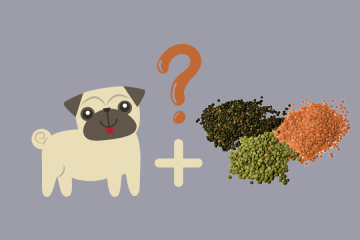KEY TAKEAWAYS
- Yes, dogs can eat fish.
- Feeding your furry friend fish could be a delish addition to their diet!
- Rich in protein and omega-3s, cooked salmon is a great choice for pups.
- If you’re looking for other options, cod, haddock, catfish, herring or flounder are also safe bets.
- Make sure the fish isn’t raw, as this can carry parasites and bacteria that won’t be too kind on Fido’s tummy.
Is Fish Safe for Dogs?
Yes, fish are safe for dogs, and canines often hunt them in the wild! However, there are some considerations to make before giving your dog any type of meat or food, including fish. Before you feed your dog with a piece of fish, make sure to check with your veterinarian about what is safe.
Can Dogs Eat Fish in Large Quantities?
Up to 10% of your dog’s diet can be fish, not counting fish-based dog foods. Fish are high in protein and healthy fats, both of which can help your dog live a long life. If you don’t have enough fishy things around the house, try making your own puppy chow out of salmon or trout.
If you’re giving your buddy fish as a stand-alone meal, aim for a portion size equivalent to 2–5 anchovies. If you’re mixing it with their regular food, start with one teaspoon and work your way up to a tablespoon over a week’s course. Too much fish can give dogs an upset stomach, so be careful not to overload them!
What Kinds of Fish Can Dogs Eat?
Before serving a dinner of fish and chips, it’s important to know the types of fish that are safe for dogs. Generally, dogs can safely eat whitefish. In fact, it’s one of the best sources of protein for dogs that don’t have allergies or intolerances.
Fish such as cod and haddock are high in omega-3 fatty acids which help dogs maintain healthy coats, as well as bones and joints. Other types of fish that can be considered nutritious dog food include salmon, catfish, herring, and flounder.

Benefits of Some Salmon for Your Dog
Dogs can eat fish, and they can be a wonderful and nutritious alternative to one or two of their meals in a week. These animals contain high levels of protein, omega-3 fatty acids that help maintain healthy skin oils in the body, as well as vitamins A and D. They are also rich with minerals such as iron, zinc, selenium or calcium, which helps keep bones strong!
Fish is beneficial especially because it contains iodine, which regulates the metabolism among other things. Iodine has been shown to decrease the symptoms of thyroid disorders. So next time you go shopping, make sure there’s some freshly caught seafood in your cart!
Can Dogs Eat Raw Fish?
You are probably wondering: can dogs eat fish raw? Well, if a dog is healthy, there are no known health risks to giving them raw fish. However, it can cause problems if the animal has certain allergies or other health issues. You need to be careful about your sources because some raw fish might contain parasites or bacteria.
Editor’s Note
Be aware that fish bones might be dangerous for your dog! If you are going to give your pet raw fish, make sure it is boneless. Always supervise them during their meal.

Can Puppies Eat Fish?
It is not recommended that puppies eat a lot of fish, because they do not have the proper digestive juices to digest a fish. Young dogs should consume small amounts at first because they may get diarrhea if given too much at once. It is important not to feed your puppy too much raw or undercooked fish, because there could be harmful bacteria on the surface that would make them ill if absorbed by their digestive system (which doesn’t yet have the ability to process such foods).
Can an Old Dog Have Fish?
Here are some fishy facts about older dogs. It turns out that you can serve fish to old dogs! You just need to make sure the kind of fish you give your pooch is boneless and skinless, as they may find it difficult or painful when eaten. An aged dog’s diet should include more omega-3 fatty acids than other types, because this helps their fur shine bright. Who doesn’t want those promised results? You can try that fish oil yourself!
Still wondering: can dogs eat fish in these or those circumstances? Read on!
Can Fish Affect a Dog’s Mood?
Can dogs eat fish? Yes, but you need to be cautious. If your dog doesn’t like the fish you feed them, they will get moody. But did you know that consuming fish can help fight depression? Fish contains tryptophan, which is essential for the production of serotonin. Serotonin is a neurotransmitter that regulates mood, appetite and sleep. So, if your dog is feeling down, perhaps try feeding it some fish!

How to Cook Fish for Dogs? How About Some Fish Sticks?
There are many different ways to prepare fish for a dog. The first step is to make sure the fish has been cleaned. If you’re purchasing a whole fish, then you’ll want to remove the guts and scales. Cook the fresh fish for 20 minutes with your dog’s food.
However, feeding your dog a regular diet of plain poached fish might get boring. Luckily, there are many ways to spice up your dog’s meals with a bit more flavor. Toppings like cheese, peanut butter chips and chopped nuts can be added to make their meal extra tasty – just watch out for dogs that may have nut allergies or food sensitivities.
Final Words on Feeding Fish to Dogs
In conclusion, can dogs eat fish? Fish is a superfood for dogs. A study showed that fish oil combined with vitamin E can reduce inflammation in the joints and give your pup an extra boost of omega-3 fatty acids to keep them healthy.
But before you start giving Fido sardines on crackers every day, consider this: most veterinarians recommend against feeding raw fish to dogs. Parasites are less likely to survive when the meat is pasteurized or cooked. Plus, some types of seafood contain mercury, which isn’t good for dogs. Feed your furry friend cooked salmon and don’t forget about their vitamin supplements. If your buddy is under the weather, you can lift his mood by feeding him fish. Thumbs up for serotonin!
Frequently Asked Questions
What Fish Is Toxic to Dogs?
There is no species of fish that is truly toxic to dogs. But there are species you should avoid giving to your pup because they contain high levels of mercury and other heavy metals. These are carnivorous fish such as tilefish, swordfish, king mackerel, albacore tuna, and shark.
What Is the Best Fish to Feed Dogs?
If you want your furry friend to reap all the benefits of fish, aim for small fatty fish such as trout, sardines, herrings, and anchovies. Cooked salmon is also a good choice.
Do Dogs Prefer Fish or Meat?
Your dog’s taste preferences are unique to them. However, in laboratory settings, it seems that dogs don’t have as strong of a preference for fish as cats do. They seem to favor beef, pork and lamb over any other type of meat.
Is Fish Better Than Beef for Dogs?
Yes, fish is generally healthier than beef for dogs. This is because it contains lower levels of saturated fats and provides easily digestible protein. Many dogs don’t get enough omega-3 fatty acids in their diet, and fish can solve that problem.
Can I Feed My Dog Fish Every Day?
No. While fish is a good source of protein and healthy fats for dogs, too much of it can lead to obesity. It’s best to give it to your dog once a week.
Lucas Taylor is a veterinary assistant, freelance journalist and single dad who lives in the suburbs with his three pups: Ruby, Nala, and Woody. He has one cat named Pepper. When he’s not writing articles or working at the vet clinic, Lucas loves cooking French cuisine for himself and friends at home. One of Lucas’ favorite things to do is paddleboard with his son Noah and their canine companions. Pepper is the homebody of the bunch – she loves chilling on the couch.












